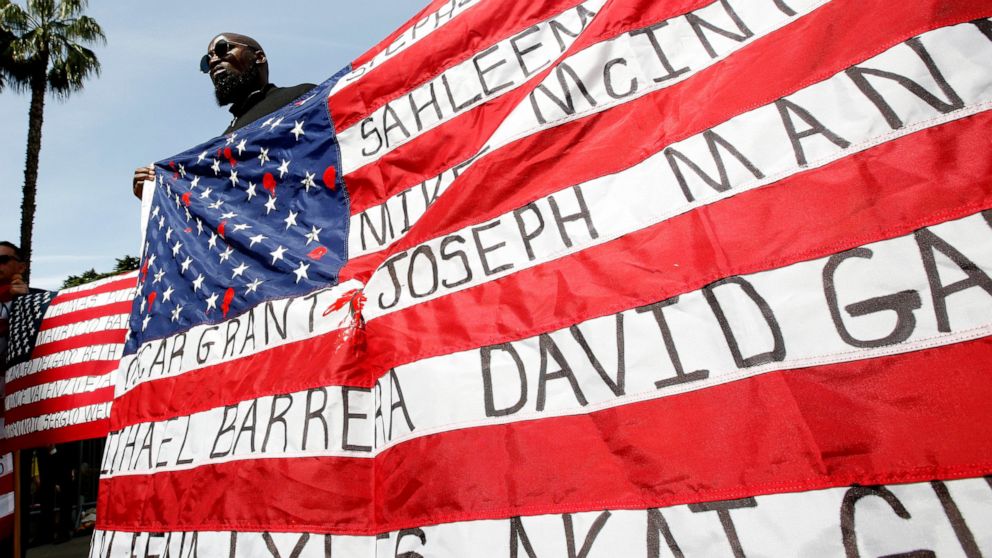
California lawmakers begin battling Tuesday over how to cut down on police shootings as they consider two radically different proposals that have stirred an emotional debate over the safety of both officers and those they’re tasked with protecting in the nation’s most populous state.
A legislative committee is expected to advance a first-in-the-nation measure restricting when police can use deadly force. The bill sparked by last year’s shooting of unarmed Sacramento vandalism suspect Stephon Clark would allow police to kill only if there is no reasonable alternative, such as verbal persuasion or other non-lethal methods of resolution or de-escalation.
“It calls for them not to use lethal force unless it is absolutely necessary, that someone’s life is in imminent danger,” said Democratic Assemblywoman Shirley Weber of San Diego, who wrote the bill that advocates hope will be a model for other states. “There are other means and methods that can be used because you respect life.”
It faces intense opposition from law enforcement groups, which are urging a different plan requiring that every department have policies on when officers should use de-escalation tactics and other alternatives to deadly force. They blocked a similar Senate-approved bill last year despite nationwide concern over the shootings of young minority men by police.
The law enforcement bill enshrines current court standards in state law, allowing officers to use deadly force when they have a reasonable fear of being harmed.
The standard has made it rare for officers to be charged after a shooting and rarer still for them to be convicted, but California Police Chiefs Association president Ron Lawrence said in statement that law enforcement plans amendments “to ensure that we are truly putting forward the most comprehensive legislative solution to effectively reduce the use of force in our state.”
Hundreds of chanting supporters of Weber’s bill marched to the Capitol on Monday, wearing yellow American Civil Liberties Union t-shirts and backed by a brass band. Supporters held three American flags listing the names of dozens of people killed in police shootings.
“It hurts. It hurts because many of us know it can be prevented,” actor Kendrick Sampson told the crowd. “And we know no one will be held accountable.”
Ciara Hamilton, a cousin of Diante Yarber, a car theft suspect who was killed by Barstow police last year in a busy Southern California parking lot, said Weber’s bill would allow that accountability. Yarber was shot after police said he struck two squad cars and nearly struck an officer, while his family says the car was barely moving and that he might have lived had officers provided immediate medical attention.
“What does that tell us about policing in California and America? It’s that black and brown people are not safe from state-sanctioned violence,” Hamilton said.
Yet despite supporters’ expectations and law enforcement’s fears, Plumas County Sheriff’s Deputy Ed Obayashi, a use of force expert, called Weber’s bill “an exercise in legal futility” because he predicts judges will interpret the language the same way they do current court rulings. Prosecutors would have to prove an officer was criminally negligent, which carries a high legal burden.
“There may be some fence-sitting cases (that would qualify for prosecution), but the officers’ conduct would have to be so out of the norm,” said Obayashi, who teaches officers statewide about use of force. “If the proponents of (Assembly Bill) 392 believe this is somehow going to shift the needle legally, I’m sorry, it’s not.”
For instance, he said the two Sacramento police officers who shot Clark last year, triggering national protests, would still be unlikely to face charges because they appear to have believed Clark was pointing a gun at them instead of a cellphone.
Weber and her co-author, Democratic Assemblyman Kevin McCarty of Sacramento, also said they expect relatively few police officers to face criminal charges even if their bill becomes law.
The standard would apply “only in a few instances, such as when an officer shoots and fires at a fleeing felon in the back,” McCarty said. “But when they do cross the line, there needs to be accountability.”
Weber said officers would have to egregiously violate a policy to face charges, but expects the necessity standard would deter shootings.
“Hopefully we won’t be dealing with the issue of people being unarmed and shot,” she said.





